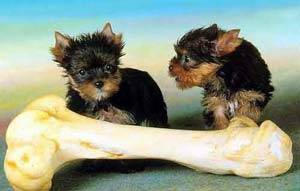If you thought human nutrition was a minefield of conflicting information, it's no easier if you're a pooch. At one extreme of the dog diet spectrum is the Biologically Appropriate Raw Food (or BARF diet) - this is the canine equivalent of the human Paleolithic diet which recommends a raw food diet that's as close as possible to what wild dogs evolved to eat - at the other are those who argue dogs do just fine on a vegetarian diet; and somewhere in the middle are the vets who recommend a healthy mixed diet.
If research into the effects of dog ownership on human health is to be believed, dogs deserve the right diet - whatever that might be. Owning a dog appears to be good for human health, helping lower blood pressure and cholesterol. But while they're busy protecting us from heart disease, living with a human is no guarantee for good canine health - otherwise why would vets be running weight-loss programs, or a canine anti-obesity drug be poised for release in the US? So what should - and shouldn't - go into a dog's dinner?
Off the menu for all dogs are foods known to be toxic to them. These include grapes, raisins, chocolate, macadamia nuts, tomatoes, onion and garlic (there goes garlic's reputation as a natural flea repellant). Cooked bones can splinter and injure the dog.
Raw bones are fine and don't feed salty foods to dogs who are overweight or have problems with their heart or blood pressure.
Like overweight humans, overweight dogs are prone to diseases like diabetes, arthritis and cancer - to keep them around longer, keep them active and don't overfeed.
I suggest a mixed diet that includes a good quality dried food, together with raw beef or lamb and vegetables. Dried food is a more concentrated source of nutrients (compared with canned food which can contain as much as 60 per cent water) - but provide lots of water.
Vegetables like raw broccoli and carrots are good to add extra nutrients and fibre. Raw chicken wings mimic a wild diet and provide calcium and other nutrients. As for fruit, not much is known about fruit and dog nutrition, though some dogs enjoy it. I know mine certainly does! She collects dropped apricots from the tree (they're too high to reach) and she actually picks peaches from the tree!
If beagles are anything to go by, a little fruit might be a good thing - a University of Toronto study found older dogs whose diet was supplemented with fruit and vegetables did better at learning new tasks.
Not everyone agrees with feeding dogs commercial dog food. The BARF diet, developed by Australian vet Dr Ian Billinghurst, recommends a diet based on raw muscle and organ meat and vegetables - and no grains. Meanwhile, many vegetarian organisations, including the Vegetarian Network Victoria, believe dogs can thrive on a plant-based diet.

So tell us what goes into your dog's bowl to keep them in good shape? Have you tried BARF or even a vegetarian diet?
Previous posts on canine nutrition: 1,
2 comments:
I feed my dogs raw, have been for about 3 yrs, since they were about 8 months old.
Chicken is the main dish, but I also buy pork neck bones, oxtails, beef heart, many other meats....what I can get on special.
Want to have some fun? Give the dogs a few chicken feet! LOL it's great to watch them!!
Seriously, dogs do NOT need grains of any kinds, and plants of all kinds are not required. Meat and bones and organ meats is what they need most. Feed them a few veggies if you like, but they aren't required for good health!
Want a nice shiny coat? Want minimal shedding? Want to say good bye to doggie breath, wet dog smell, and minimise output? Go raw!!!
I'd say the conventional commercial dry kibble pet diet is the extreme diet, not the biologically appropriate BARF diet. While I don't have dogs, I have two cats (cat are even less likely to do well on commercial dry kibble) and they are far healthier now that they are off the commercial food (of any kind) and eating a balanced homemade raw bones & meat diet.
It isn't nearly as expensive and time-consuming as one would think, especially with a bit of planning and fewer veterinarian visits as a result.
Despite all the hype about pampered pets these days, we are slowly killing our pet companions with highly processed commercial pet foods.
The most common chronic diseases of pets are the same as for humans, and many of them are diseases of lifestyle - diabetes, kidney disease, heart disease. If cheap, highly processed junk food isn't good for humans, why should anyone be surprised that it also isn't good for our pets, some of which have even stricter nutritional needs than the more omnivorous humans and dogs, i.e., cats, which are obligate carnivores. These animals didn't make it into the 20th century eating kibble, just as humans didn't evolve eating Chef Boyardee.
Post a Comment